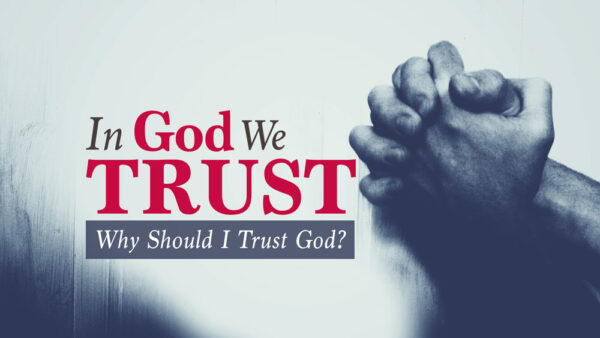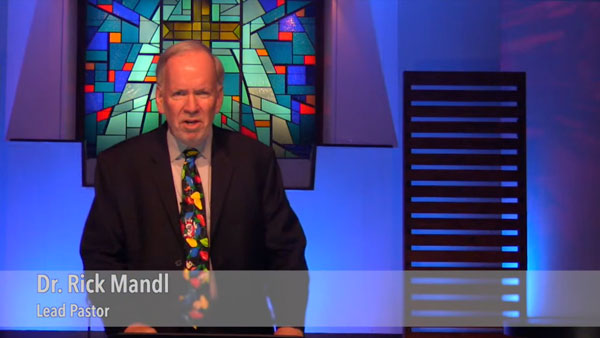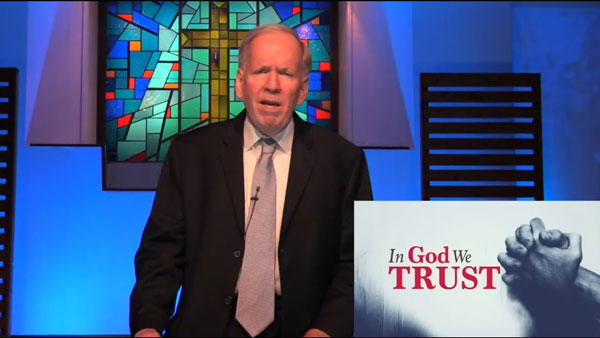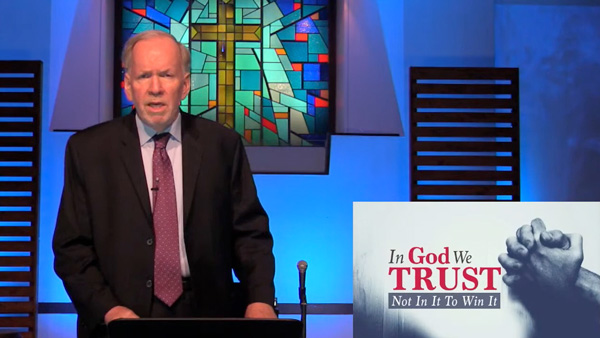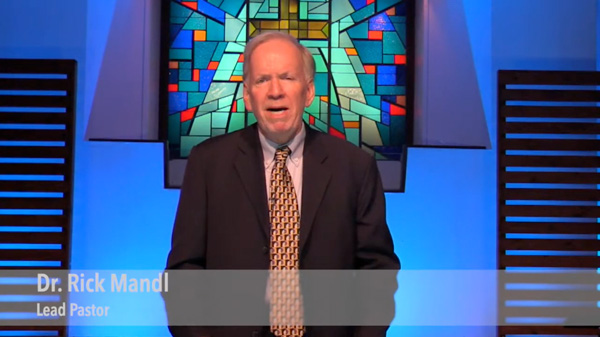Dr. Rick Mandl - January 10, 2021
Under The Influence
Sermon Manuscript: In God We Trust Message 2- Under The Influence
Sermon preached by Dr. Rick Mandl, Eagle Rock Baptist Church, January 9 & 10, 2021
Recorded in Los Angeles, CA.
As we come together for worship this weekend, we extend our love and condolences to the family of Romo Cantal. Long-time member here at ERBC, very involved in service, loved to share his faith, loved to share God’s Word. By vocation, Romeo was a civil engineer who worked in construction as president of the Cantal Construction Company, but he knew his calling, and his passion was to share Jesus Christ – every opportunity he had. This led him to be involved with an organization called “The Gideons” who most people think of as the ones who put those Bibles in hotel rooms – the Gideon Bibles
But more than that they are people who are dedicated making God’s Word available to everyone. Toward that end they’ve worked to take God’s Word in 95 languages to 200 countries around the world.
Romie was known to many here in our church family through his year’s of ministry at ERBC.
But funnily during this pandemic which has closed many of our churches when it came to meeting face to face, Romie became known to many more in our church family, through his participation at our Saturday night online services. Romie would regularly post in the chat box, as he watched the service from his home in Glendale, and would welcome, and introduce us, online to friends of his who were watching from the Philippines. It was three year’s ago that we said goodbye to Romie’s wife Lorna, who went to be with Jesus. And so, while our prayers are with the Cantal family upon the occasion of Romie’s homegoing – we do give thanks that Romie and Lorna are together again, with the Lord they loved. Would you pray with me . . .
Father, as we’re going through a teaching series called “In God We Trust” – I’m glad that as we’re saying goodbye to member of our church family, we can do so knowing that he lived a life characterized by trusting in you. Romie trusted in you day by day as he walked with Jesus, And prior to that he made the decision to place his trust in his Lord Jesus Christ for his salavation and because of that . . . Not because of his good works . . . But because of the work of Jesus on the cross . . . He’s with you now. May you comfort family and friends with the anticipation of a reunion when they join him in your heaven - - - Thank you for his life - - For a life well lived in service to you - - In Jesus' Name.
Hey church family. These are trying times for our nation. I don’t have to tell you that. You only have to turn on the t.v. to see it for yourself.
And because of that it’s a good time to ask ourselves, as we’re looking at what’s going on around us and as we’re lookin to the future. . . What are we hoping in? What are we trusting in? Today what I’d like to do is to take a step back and let God’s Word reset our hearts and prepare us to continue to trust in Him and walk with Him no matter what the future holds.
We begin with a verse from 1 Peter 5:6, that says, "Humble yourselves..." Pause there for a moment. Why is it important for us to humble ourselves? It’s important because, there is one God, and we’re not Him. Whoever is sitting in the office at 1600 Pennsylvania Ave is not him. And so it’s important to we keep that perspective it’s good to "humble yourselves, therefore, under God’s mighty hand, that he may lift you up in due time” (1 Peter 5:6).
Today I want us to think about what it means to live “Under God”
In fact, you might want to underline that part of the verse in your notes . . . Just those words. . . UNDER GOD. And I want us to consider the question of how do we, as followers of Christ, live under God in a culture that's becoming increasingly hostile toward God? How do we, as disciples of Jesus, faithfully serve him, faithfully live for him, faithfully represent him in a culture that's becoming increasingly hostile toward God.
I want to talk about how we live under God. But before we talk about how we live under God, I want to first try to identify and help you identify in your own walk. . . What it is that you're actually living under right now. In fact, I'm gonna show you a scale that will come up on your screen with the numbers between 1 and 10. And I want you to try to place yourself on this scale. When you look at your own life, what is that’s influencing you? Are you under the influence of God? Is he influencing most of your decisions, directing your steps, moving your emotions and leading you every single day? Or would you say you're more under the influence of culture… The systems of this world, the thinking of this culture.
If you’re someone who would say, "I don't even believe in God. Then obviously you’re over on the left on this scale You’re under culture. Maybe you would give yourself a one or a two." Or you might say. . "No, I'm really, really passionate about the things of God, I'm under God." I’m going to give myself a 10. Don't give yourself a 10. You're not a 10. Jesus is a 10. You might be a nine, but you're not a 10. But what I want you to do, is try to think about, what are you under? What’s influencing you?
Maybe to break it down you could think about some different categories. Let's start with like, "What entertains you?" Think about that for a moment. I want you to think about whenever you watch something, enjoy something, listen to something . . . Would you say that you're more under the influence of God? Meaning before you watch a show on Netflix, before you listen to some music, before you read something, before you open up social media, you're thinking consciously asking, "Is this pleasing to God? Is this going to help build my faith?" And if the answer is no, you might stay away from it. If the answer is yes, you might go toward it. Would you say that which entertains you is influenced by God?
Or would you say you're more under culture? In other words, you're kinda entertained by whatever is recommended next, perhaps on Netflix. Doesn’t matter if it's God honoring.. Doesn’t matter if it's filthy. . . If it's funny, or if it’s high quality -- that may be good enough for you. When it comes to the music you listen to, or what you read.. Are you more under culture or are you more under God?
Let's talk about another category. When it comes to your money. Maybe you get paid once a week, once every two weeks. When you you have money, what influences what you do with your money? Would you say that you're really, really, really under God. Like you recognize this comes from God is a gift from God, so much so that I wanna worship God with the very first that comes in. I wanna give him the tithe, because I know this comes from God. And then you recognize, "I really want to honor God with what I have. You want to be a good steward. Sure, I'm going to enjoy some, but more than that I'm gonna use what I have to make a difference in this world.
Again, "When it comes to your money, are you really under the influence of God?
Or would you say, it's probably more under the influence of culture? In other words, you probably don't even think about God. And IF you're gonna give to God, it's not first, it's probably last, It’s from whatever's leftover if you can afford to. Because culture drives and consumes your spending and you find that almost whatever comes in, goes out because you see the ad and you want it. And you think, "If I have that, I'll be happy."
What about the WORDS that you speak? Think about the last week, just what you said during the week. Would you say that you were under the influence of God, as you were speaking to people. In other words, your words were life-giving, your words were God-honoring, your words were encouraging and pointing people toward eternity and the things that last and the things that matter. Or would you say you're more under culture? Meaning, yeah, you kinda just go along with the flow and everybody else is griping so your griping too.
And you're tearing people down and your words are angry and sometimes hateful and often critical.
When it comes to politics you found yourself talking bad about all those LIBERAL idiots or all those CONSERVATIVE idiots or whatever it is? When it comes to your words, would you say that they're more influenced by God? Or would you say they're more influenced by culture?
One more category. How about your SELF-WORTH? Talking about the way you feel about yourself? Would you say that you're under the influence of God? Meaning it doesn't really matter what other people say about me or what they think about you. What matters most to you is who you are in Christ. And to the best that you can, you’re living your life for an audience of one rather than for the approval of others. Would you say that your self-worth is more based on what God says about you, or what others say about you?
A lot of us have never taken the time to think about what it is that influences us. And today I want to challenge you to do that, and the way I want to do that is to look at the example of an individual in the Old Testament named Daniel. Many of you have probably heard of Daniel. Most people know Daniel from the story of Daniel in the lion's den. It's a powerful story. But long before Daniel ever got to the lion's den, you find another interesting story in Daniel Chapter 1. And that’s what I want us to zero in on..
Daniel was a young man who had been raised worshiping the one true God – Jehovah. But then one day an evil King named Nebuchadnezzar came with his army and invaded Daniel’s homeland
Nebuchadnezzar and the Babylonian army invaded Jerusalem.
This invading army completely destroyed Daniel's Homeland, they burned the temple to the ground, they wrecked the city. And they took a number of young me as prisoners and transported them to Babylon where they were forced to serve as slaves. Daniel was one of those captives.
As we come to Daniel chapter 1 we find that King Nebuchadnezzar does something very interesting. The king tells one of his palace officials and he says “Go out to those slaves and pick out the best and brightest and bring them in and let them live in my palace and let them eat my food.” King Nebuchadnezzar's desire was to raise up future leaders. So he reasoned - “If these young men were the best and brightest of Israel, maybe they have something to offer my kingdom. Maybe they will be the best and brightest now in Babylon.”
So Daniel and some of his friends are chosen to come and live in the king's palace. The plan was to Babylonianize them. You can read the story for yourself in Daniel 1:3, it says, "Then the king ordered Ashpenaz, chief of his court officials, to bring into the king’s service some of the Israelites from the royal family and the nobility— 4 young men without any physical defect, handsome, showing aptitude for every kind of learning, well informed, quick to understand, and qualified to serve in the king’s palace" (Daniel 1:3-4a).
And thus began a plan, as I said to Babylonianize these young men. The chief of the king’s court officials was going to . . . He was to teach them the language and literature of the Babylonians. The king assigned them a daily amount of food and wine from the king’s table. Stop there for a moment. Now this was not the normal food they would eat. This was food that was dedicated to pagan gods and the scripture continues and says. . . Verse 5 concludes by telling us . . . They were to be trained for three years, and after that they were to enter the king’s service. Daniel was one of several young men that was taken prisoner. And the Babylonians then changed their language, changed their education, indoctrinating them with the Babylonian views so they would be under the culture, under the thinking, they even changed their names.
Verse 6 tells us. . . “Among those who were chosen were some from Judah: Daniel, Hananiah, Mishael and Azariah. The chief official gave them new names: to Daniel, the name Belteshazzar; to Hananiah, Shadrach; to Mishael, Meshach; and to Azariah, Abednego.” Originally their names reflected the one true God but these young men were given new that represented the pagan gods. And as I read, they changed their diet so they wouldn't eat that which was good, right, pure and healthy but instead would eat food that was dedicated to pagan gods. The goal was to bring these young men under the influence of the Babylonian culture.
The king reasoned, "If we can change the way they think, then we can change what they believe. And if we can change the way they think and what they believe, we can change how they will behave." It’s a this point that Daniel’s faces his first TEST OF INTEGRITY. Long before he faced the lion's den, Daniel faced the diet test. He said, “Will I live according to God's standards?
The answer is found in Daniel 1:8. There we read. . . "But Daniel resolved not to defile himself with the royal food and wine..." Go ahead and underline that word . .. resolved. That word “resolved” may be the most important word in this message and so I’ll come back and unpack it in just a moment, but before I do, let me review for you what’s happened up to this point . . . Daniel has had to compromise in a lot of areas. You read his story and you’ll find that Daniel compromised in a lot of ways.
Compromise is not always a bad thing. The king says “I want these young men to dress like Babylonians.” Daniel said, “Okay, you want me to dress like a Babylonian, I’ll dress like a Babylonian.” The king says I want them to be assigned Babylonian jobs . . . Daniel said, “Not a problem – what have you got for me to do?” The king said, I want to change their names. . .give them Babylonian names. Daniel, hmmm. I’ve sure grown accustomed to the name “Daniel” - - - after all that’s what they’ve called me all my life, but . . . you want to give me a new name . . . “You want to call me Belteshazzar. . . . “Okay then Belteshazzar it is, whatever floats your boat.” He agrees to dress Babylonian. He agrees to get a Babylonian name. He agrees to take a Babylonian job. Get a Babylonian education. . .
There were a lot of ways he participated in Babylonian society. But where Scripture said “NO” he said “NO.” Daniel said “I can compromise on a lot of those cultural areas… But where the Bible says No I say No.” And in his case, it was in the area of diet. And he knew that as a Jewish young man, who was committed to live by the laws given in the Hebrew Scriptures, he couldn’t in good conscience, eat the food that was being set before him. It was food that had been sacrificed to idols. . . It was food that was not kosher. . . Again, back to verse 8 . . . But Daniel resolved not to defile himself with the royal food and wine, and he asked the chief official for permission not to defile himself this way.
Now God had caused the official to show favor and compassion to Daniel, but the official told Daniel, “I am afraid of my lord the king, who has assigned your food and drink. Why should he see you looking worse than the other young men your age? The king would then have my head because of you.” Daniel then said to the guard whom the chief official had appointed over Daniel, Hananiah, Mishael and Azariah, “Please test your servants for ten days: Give us nothing but vegetables to eat and water to drink. “Then compare our appearance with that of the young men who eat the royal food, and treat your servants in accordance with what you see.” So he agreed to this and tested them for ten days. “At the end of the ten days they looked healthier and better nourished than any of the young men who ate the royal food. So the guard took away their choice food and the wine they were to drink and gave them vegetables instead.”
And if this weren’t a true story, you conclude it by saying that . . “They all lived happily ever after” But it is true, and it did happen, and …. It all began with that decision that Daniel made that we’re told about in verse 8 where it says. . ."But Daniel resolved not to defile himself with the royal food and wine," That word “Resolved” means . . . He Pre-decided. He decided in advance. . . He made a pre-determined resolution. A resolution to not live “under culture’ but “under God.” What’s interesting in that Daniel didn't push back when they took away his name. Because he knew that was an outward label, and inwardly, he knew who he was. He didn’t push back when they enrolled him in a Babylonian course of education . . . . Or taught him the Babylonian lanuage, Or gave him a Babylonian job to do. He compromised in a number of areas. . . But he had resolved. . . He had pre-determined. . . He had decided in advance . . That he would draw a line in the sand, where God had drawn the line. And of course that pre-supposes, that you know where that is.
As we seek to be people who are “living under God” as opposed to “living under culture.” That’s going to require that we make some decisions. Trust me on this. . . Nobody stumbles into righteousness. Nobody just drifts into godliness. It starts with a decision and plan. It’s really the same as in any other area of life. We can't halfway follow Jesus. We know this but yet we often forget it. Because we don't recognize how much under the influence of culture we really are.
Think about any other era of your life, and ask… "Can you just kinda sorta try and become great?" Take your body. Let's say, you wanna get healthy. What's your plan? Well, I'm gonna work out one time a month. You think you work out one time a month to get in good shape? Good luck. Or let's talk about your diet. Some people commit to healthy eating but then have a cheat meal once a week, One meal a week, they eat something unhealthy. You say, well how about if I try that the other way around? "I'm gonna have a healthy meal once a week, and I'm gonna get in shape." That's just crazy, that's just crazy. Same with your relationships. Imagine I said to my wife, "I wanna have a really good marriage, so I'm going to be nice to you once a week." That’s crazy, right?
And yet, for so many of us as followers of Christ, "I want to be close to God, so I may go to church once a week." But that's about it, nothing else. And one day we wake up wondering why we’re not closer to God. Our memory verse for this week. . . “Do not conform to the pattern of this world, That’s another way of saying. . . Don’t live under culture. Okay, don’t do that, then what’s the other option?
The other option is . . . but be transformed by the renewing of your mind. Then you will be able to test and approve what God’s will is—his good, pleasing and perfect will” (Romans 12:2). How do you renew your mind? With God’s Word. And this weekend, while we’re still at the start of a new year, is a great time to commit to getting into God’s Word, and getting God’s Word into you. If you’ve got a plan that you’re working . . .consistently. . . to get you into God’s Word. . . Then keep on doing it. If you don’t. . . There’s a link in the box on the back of your notes to the YOUVERSION Bible plan And when I say plan, it’s actually plans. . . .
Bible App features 2,062 Bible versions in 1,372 languages, audio Bibles for popular versions, offline capabilities, as well as over 800 Bible Plans. Plans for you to read your Bible. Plans for you to have your Bible read to you. Plans for you to read it while it’s read to you. Which one is the best plan for you? I’ll answer that the same way I heard someone answer the question. . . What is the best piece of exercise equipment at the gym? It’s the one you’ll use. The same with a Bible reading plan. . . One year plan, 30-Day plan, Whole Bible, New Testament Only.
We also send out Daily Devotionals - - not a substitute - - but a supplement - - you can sign up for that on your connection card
I mention it today because a couple of days ago, R.B. did one on the importance of getting in to God’s Word. If you want to be someone who lives UNDER God, rather than UNDER Culture, it starts with Getting His Word into you. Let’s pray. . .
Recorded in Los Angeles, CA.
Scripture References: Romans 12:2, Daniel 1:3-16, 1 Peter 5:6
From Series: "In God We Trust"
We all put our faith in something: family, a job, ourselves, or even the church. But quite often we end up disappointed when that something lets us down. The Bible says the only place to put our trust is in God. What if we're not sure that God can be trusted? How do we learn to do that?
